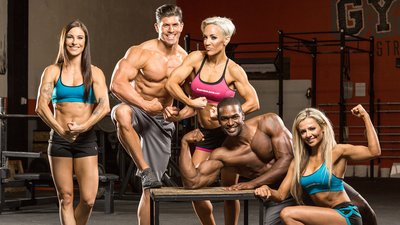I've written several strength programs for Bodybuilding.com, to which I've pointed a number of eager readers desiring to build Herculean strength. But a good program isn't everything, and it doesn't necessarily guarantee success.
So, aside from following a well-constructed lifting plan, what else should a lifter do to begin his or her strength journey? For starters, keep the process simple and follow these three important tips!
1. Win the First Battle
Whether your goal is performance based or aesthetic, the hardest part of any achievement is simply getting started. Breaking inertia is the toughest action, but it's without question the most important. Luckily, the solution to getting started is simple: Win the first battle.
People often fail to achieve their goals because they start too big—they see a massive, far-off goal on the horizon and it looms over them, stifling action. But if you start with a small, winnable battle, it's easier to kick inertia where it counts and get the ball rolling.
For example, let's say you want to increase your training frequency. In fact, you'd like to do some kind of workout every day of the week. That's a big goal. Furthermore, let's say that if you don't train first thing in the morning, your chance of achieving your goal steeply drops.
But working out every morning is still a big change. There must be a momentum-building, smaller battle to fight that increases your likelihood of success, right? There is: getting out of bed as soon as your alarm clock goes off!

Decide what your first, small battle is...and win it.
If you can win the small battle of responding immediately to your alarm clock, you can build on that moment in your workout-frequency goal. Winning early frames your mindset positively and shrinks the obstacles that you face. Tasks that normally seem dauntingly shrink from perceived mountains to molehills.
But this entire chain of positivity begins with winning small battles. Decide what your first, small battle is...and win it.
2. Find Consistency
Training is a world full of variables to manipulate. There's intensity and volume, rest periods and training frequency, and many other dials to turn and levers to pull. Now, I'm no scientist, but that certainly seems like a lot to consider.
Ready for a bold statement? None of those variables are as important for reaching your strength goals as one often-forgotten variable: consistency.
Remember the momentum you started by winning your first battle? It's consistency that takes that momentum and turns it into progress. Progress, in turn, becomes achievement.

The people who find a way to show up every day are the ones who reap the biggest rewards.
Screw the sets and reps. Screw how much weight you're putting on the bar. What's going to keep you training consistently? Is it an environment like a hardcore gym? Is it doing exercises that you like? Is it having a training partner?
These are the questions we all need to answer to keep ourselves consistent and building momentum, because despite what we're often led to believe, it's not the individual who crushes himself with crazy programs who most often succeeds. The people who find a way to show up every day are the ones who reap the biggest rewards.
Determine what will keep you consistent, and use it to power through the year.
3. Find Sustainability
I've been a strength coach for nearly my entire adult life, and during my developing career, I've been asked more questions about diet than anything related to hoisting barbells. It's always, "What do you think about this diet?" or, "Do you think this diet will help me lean out?"
My answer to both questions is always, "It depends."
Diets have a finite beginning and end. That's all well and good—so do most training programs. But most diets call for ridiculous behavior changes, consuming inordinate amounts of one or two macronutrients, or creating severe caloric deficits. With the right application and the right person, they all might work. But what happens when they diet is over?

There's no diet in the world that will do what good, sustainable nutrition does.
There's no diet in the world that will do what good, sustainable nutrition does. Sustainability comes from building small habits over time and consistently winning small battles one at a time.
Going all-in on some outrageous diet is rarely the answer, especially when someone hasn't established good behaviors to underpin that diet. Alas, most diets demand too-big changes, and they often don't help people develop habits that carry them forth after the diet ends.
So What Are You To Do?
Start simple with a food journal. For three days, write down everything that goes into your mouth without judging yourself or changing your behaviors because you're putting pen to paper. At the end of those three days, examine what you've written, and find what you're already doing well. Celebrate it, and build momentum based on those bright spots.
If you're already eating breakfast every morning, great! But maybe your breakfast could have a little more protein, so start there! Improve your breakfast, conquer that one goal for at least a week, and then re-evaluate. Find the next bright spot to improve, and introduce another small, sustainable change.
The same process holds true for training. A sustainable program always trumps one that kicks your ass every day. Discover what kind of training you can sustain, and do that. If powerlifting fits your body and your psyche and keeps you progressing, do it. If kettlebells keep you strong and feeling healthy, sling bells all over the place. Find what fits you and get moving!
A Stronger Year
All three of these tips are simple, and all three can lend structure to your training, nutrition, and life. Start now, act on all three, and you'll have a stronger year ahead!
If you're just getting started, try my Beginner's First Strength Phase and Phase 2. You may even like to check out the five biggest beginner's strength-training mistakes to make sure you're really off to a great start!

